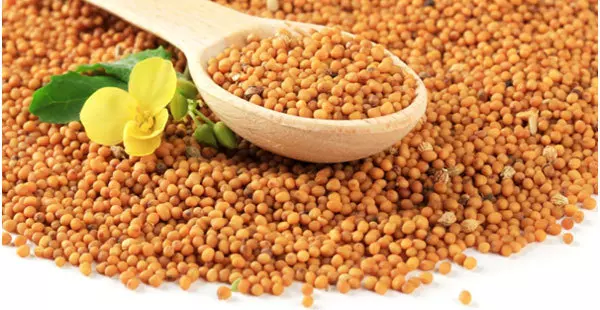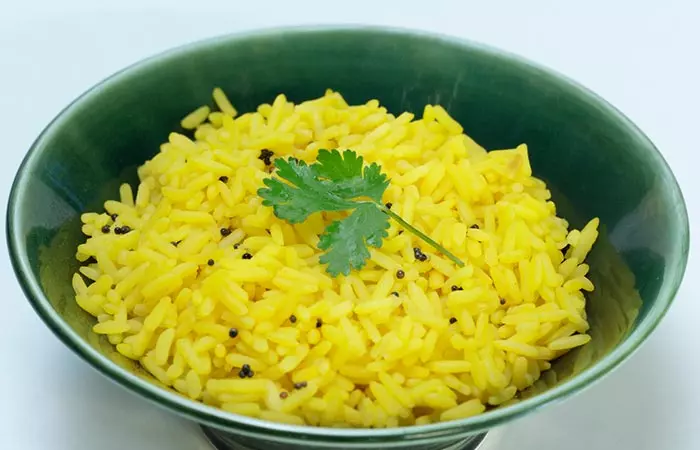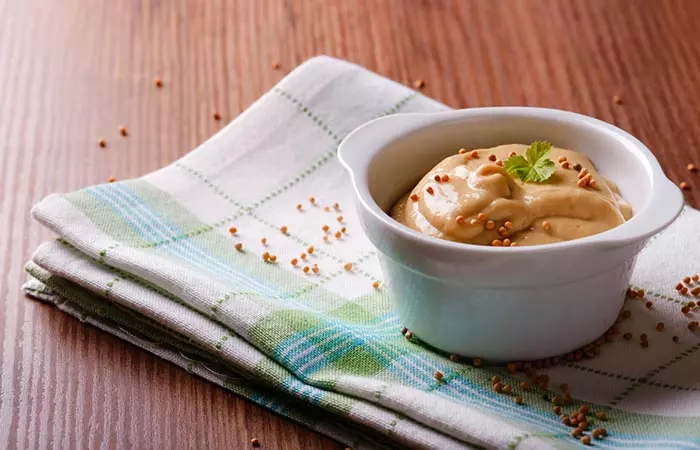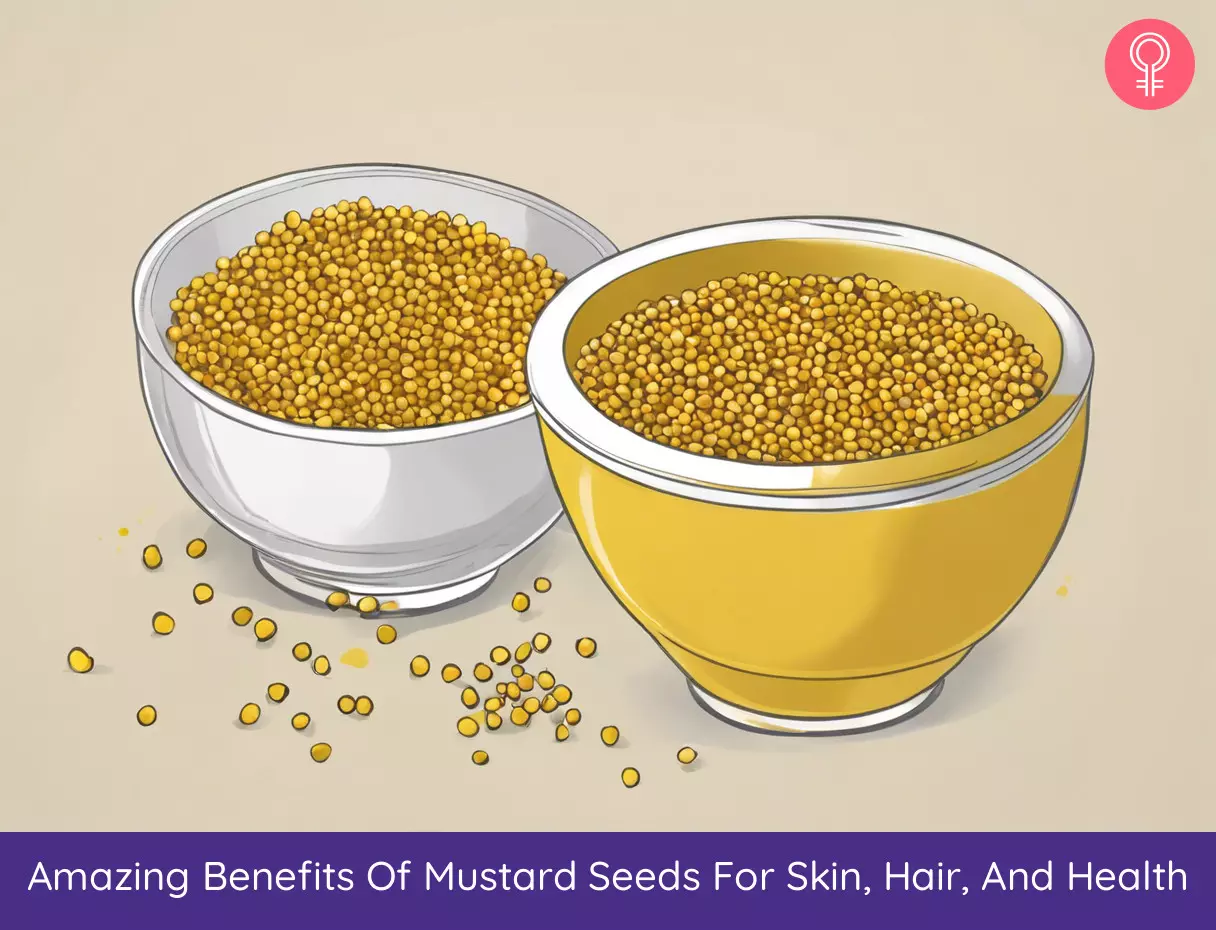While mustard seeds are popularly used for seasoning or making curry pastes, they are also used to make mustard ketchup or spreads in American and other cuisines. Mustard seeds are rich in antioxidants and anti-inflammatory properties that help improve many health conditions (1), (2). These tiny seeds are also replete with essential nutrients for the growth and development of your bones. Continue reading to explore the many benefits of mustard seeds. Continue reading to explore the many benefits of mustard seeds.
Health Benefits Of Mustard Seeds
Is mustard good for you? The answer is yes. Apart from the taste benefits of mustard seeds and the easy availability that made them popular, mustard seeds offer numerous medicinal and health benefits. Some of the health benefits of mustard seeds are mentioned below. What Are Its Benefits? May relieve congestion, improve skin health, promote hair growth, and relieve muscle pain. Who Can Use It? Anyone can consume it except for people who frequently take antacids and who take anticoagulant medication. How Often? It is best to consume it every day for optimal health. Caution Avoid consuming it if it causes stomach pain.
1. Reduce The Risk Of Cancer
Compounds like glucosinolatesi A group of secondary metabolites (competitive molecules) found in cruciferous vegetables, such as cauliflower and broccoli. and myrosinase in mustard seeds are known to use phytochemicalsi Chemical compounds found in plants that protect them against bacteria, fungi, or viruses and are rich in vitamins and minerals. that inhibit the growth of cancer cells. This is definitely a major mustard seeds health benefit (3). However, more research on humans is needed to understand this phenomenon of mustard seeds.
2. Rheumatic Arthritis
Mustard seeds may help relieve symptoms of rheumatic arthritisi An autoimmune disease that causes chronic inflammation, bone erosion and pain in the joints, especially those of the hands and feet. (4). Also, much anecdotal evidence suggests that the selenium and magnesium content in mustard seeds may help provide relief from this problem.
3. Migraine
Migraine occurrence also reduces owing to the magnesium content present in the mustard seed (5), (6).
4. Respiration Congestion
Mustard seeds or mustard, in general, is known to relieve any congestion problems in respiration (7). In addition, mustard seeds contain compounds like allyl isothiocyanate, which has antibacterial qualities and can help ward off bacteria and viruses that may cause congestion. However, limited data is available to prove this claim.
5. Disease Prevention
Mustard seeds contain essential nutrients that help prevent certain diseases from occurring. They exhibit anti-cancer and anti-inflammatory properties that help prevent tumor cell growth and may also prevent chronic diseases like arthritis.
6. Dietary Fiber
Mustard seeds are a good source of dietary fibers that improve digestion in the body. They make bowel movements better, thus improving the overall metabolism of the body. The fiber content may also help promote gut health and reduce diarrhea.
7. Cancer Risk Prevention
Selenium content in mustard seeds provides good resistance to the body against cancer cell formation. It is known to slow down the rate of development of cancer cells and also acts as an antioxidant (7).
8. Blood Pressure and Menopausal Relief
A number of nutrients present in mustard seeds like copper, iron, magnesium and selenium also assist in the treatment of blood pressure and menopausei It marks the end of monthly menstrual cycles in women between the age of 40 and 50 due to a decline in female reproductive hormones. relief. However, limited data is available in this regard.
9. Asthma
Mustard seeds are also known to be beneficial for people with asthma. The presence of minerals like copper, magnesium, iron, and selenium in it is responsible for the prevention of asthma attacks (8).
Skin Benefits Of Mustard Seeds
- Natural scrub: Mustard seeds are a natural scrub. You can add it to either lavender or rose essential oil. Use this mix to scrub your face and exfoliate dead skin.
- Hydrates skin: Mustard seeds, used with aloe vera gel, can act as a great combination to hydrate your skin. It may help remove all impurities from your face and nourish it from within.
- Slows Down The Signs Of Aging: Mustard seeds make for a great source of carotene and lutein. It is also a great powerhouse of vitamins A, C, and K. Also, anecdotal evidence suggests that the bioactive compounds in mustard seeds possess antioxidant properties, which may help protect cells from free radical damage and reduce fine lines and wrinkles. However, there is limited data available to prove these claims.
- Fights infections: These seeds contain a good amount of sulfur, which is known for its antifungal properties. Much anecdotal evidence suggests that they help ward off skin infections, both when taken orally or used topically.
Hair Benefits Of Mustard Seeds
- Hair growth: Mustard oil benefits the hair, as well. The oil, extracted from mustard seeds, is a good source of Vitamin A. Vitamin A is a great nutrient for hair growth. Mustard seed oil also acts as a great stimulant when used topically, which leads to faster hair growth (9).
- Strengthens hair: Mustard seeds contain protein, calcium, vitamin A and E, omega-3 and omega-6 fatty acids. All of these together strengthen your hair from within. Strengthened hair means lesser hair fall too.
- Conditions: Mustard seeds contain fatty acids. These are known to condition your hair from deep within when used topically or orally. It also gives hair a good shine and bounce.
Other Uses
Many varieties of mustard seeds are available worldwide, each with its unique flavor profile and culinary uses. Learn more about them below.
Types Of Mustard Seeds
The most common varieties are yellow, brown, and black mustard seeds.
Yellow Mustard Seeds: They are also known as white mustard and have a mild and slightly tangy flavor. They are used to make the classic yellow mustard condiment. Brown Mustard Seeds: They have a more pungent and robust flavor and are used to make Dijon mustard, a staple in French cuisine. Black Mustard Seeds: They are the spiciest type with a strong, almost horseradish-like heat. They are frequently used in Indian and African cuisines to add zest to curries and pickles.
How To Select Mustard Seeds
How To Store
How To Use
A blogger shared that her mom suggests it is necessary to pop mustard seeds in oil before adding them to your dishes. However, since she was on a diet that restricts the use of fats, she tried popping them without oil on a heated pan. She states in one of her blog posts, “There was no audible popping. But after a few minutes, on close inspection, I saw that the seeds have a small crack in them (i).” In case mustard seeds are unavailable, you may also use mustard seed nutritional supplements to enjoy its benefits. However, consult a doctor before using it.
Interesting Facts About Mustard Seeds
Recipes Using Mustard Seeds
1. Mustard Seeds Rice
Boil some rice. Right before serving, temper a little ghee in a pan, add yellow, white and brown mustard seeds. Add some cumin seeds. Once they start to splutter, add rice and serve immediately. Mustard seeds will add a new flavour to the rice. Serve it hot with other vegetables, curry or dal.]
2. Mustard Seeds Dip Sauce
Add mustard seeds, honey and few other seasonings of your choice together. This would make for a pungent yet sweet tasting dip.
3. Cabbage With Mustard Seeds
Chop some cabbage and onions. Heat some oil. Sprinkle mustard seeds all over and cover the lid immediately. Wait till the seeds settle down and stop spluttering or popping. Now add cabbage and onions. Heat it on a medium flame. Now cook it till the cabbage turns a little tender and add salt to taste. Serve it as a crunchy side dish. It can also be used as a filling in quesadillas. Many people add this to pasta by tossing it along and make it a main dish. The next time you use mustard seeds, remember you’re having a plateful of benefits. Hope you can put the information shared through this article to use. Please leave us your comments below. Thank you!
Mustard Seeds USDA Nutrition Chart
According to the U.S. Department of Agriculture, 100 grams of mustard seeds contain (11): Mustard seeds of weight one tablespoon in one serving contain the following nutrients.
It has 32 calories, 2.28 grams of fat, 0.818 mg of sodium, 0 mg of cholesterol, 1.77 grams of carbs, and 1.64 grams of proteins.
Apart from this, the dietary value of Calcium, iron, vitamin C, Vitamin A are 65, 6%, 1% and 0% respectively in this quantity.
Consuming mustard seeds can help your health, skin, and hair in several ways. But is it safe for all? Keep reading to learn more.
Side Effects Of Mustard Seeds
Mustard seeds are generally safe for most people, but consuming them in high quantities can lead to some health concerns. People allergic to mustard (including seeds and greens) may develop skin, respiratory, and gastrointestinal issues. Consuming a large amount of mustard may cause symptoms such as (12):
Bloating Vomiting and nausea Skin rashes Chest tightness Swelling of the lips and tongue Dizziness Redness
Therefore, those who are allergic to mustard should stay away from using it. If you experience any of the side effects, consult a doctor immediately for treatment. How to eat mustard seeds for weight loss? See the infographic below for more information on this remarkable elixir that can help you resolve your problems.Illustration: StyleCraze Design Team Prepare mustard seed paste and add it to your favorite curries or sprinkle some ground mustard seeds on your salads. These seeds are low in calories and high in fiber, so incorporating them into your diet may aid in weight loss. However, there is not much scientific evidence to prove this claim. What do mustard seeds taste like? Mustard seeds have a pungent taste after chewing, and their flavor varies with their type. How to cook mustard seeds? Heat some oil in a pan and add the mustard seeds. Once the seeds have popped, reduce the flame and let it simmer for 2-3 minutes. Is it OK to eat mustard seeds every day? Yes. Daily intake of mustard seeds in moderation is considered safe. If you consume them in excess, it may cause some side effects like digestive discomfort and allergic reactions. Do mustard seeds contain cyanide? Yes. Mustard seeds contain traces of toxic compounds like sinigrin, which can potentially be converted into hydrogen cyanide under certain conditions. High levels of this cyanide may cause airway irritation and edemai Swelling or puffiness caused by excess fluid trapped in the body due to a leak in a blood vessel. . Does mustard contain curcumin? Only American mustard contains curcumin. It is a powerful antioxidant, which is also responsible for its yellow color. Which is better: yellow or black mustard seeds? Yellow mustard is milder and better suits condiments, while black mustard is spicier and helps maintain the original flavor of food. Does mustard help you sleep? Possibly. Mustard seeds are rich in magnesium. This nutrient is linked to better sleep quality and duration (13). Does mustard lower blood sugar? Yes, it may lower blood sugar levels. A few animal studies suggest that mustard oil helps lower blood glucose levels and increase insulin concentration (14). However, more research on humans is warranted.
Illustration: Amazing Benefits Of Mustard Seeds For Skin Hair And Health
Learn more about the amazing health benefits of mustard seeds. Watch this video to discover how these tiny seeds can help improve your overall health and well-being.










![]()

